Photo: Greg Doherty/Getty Images
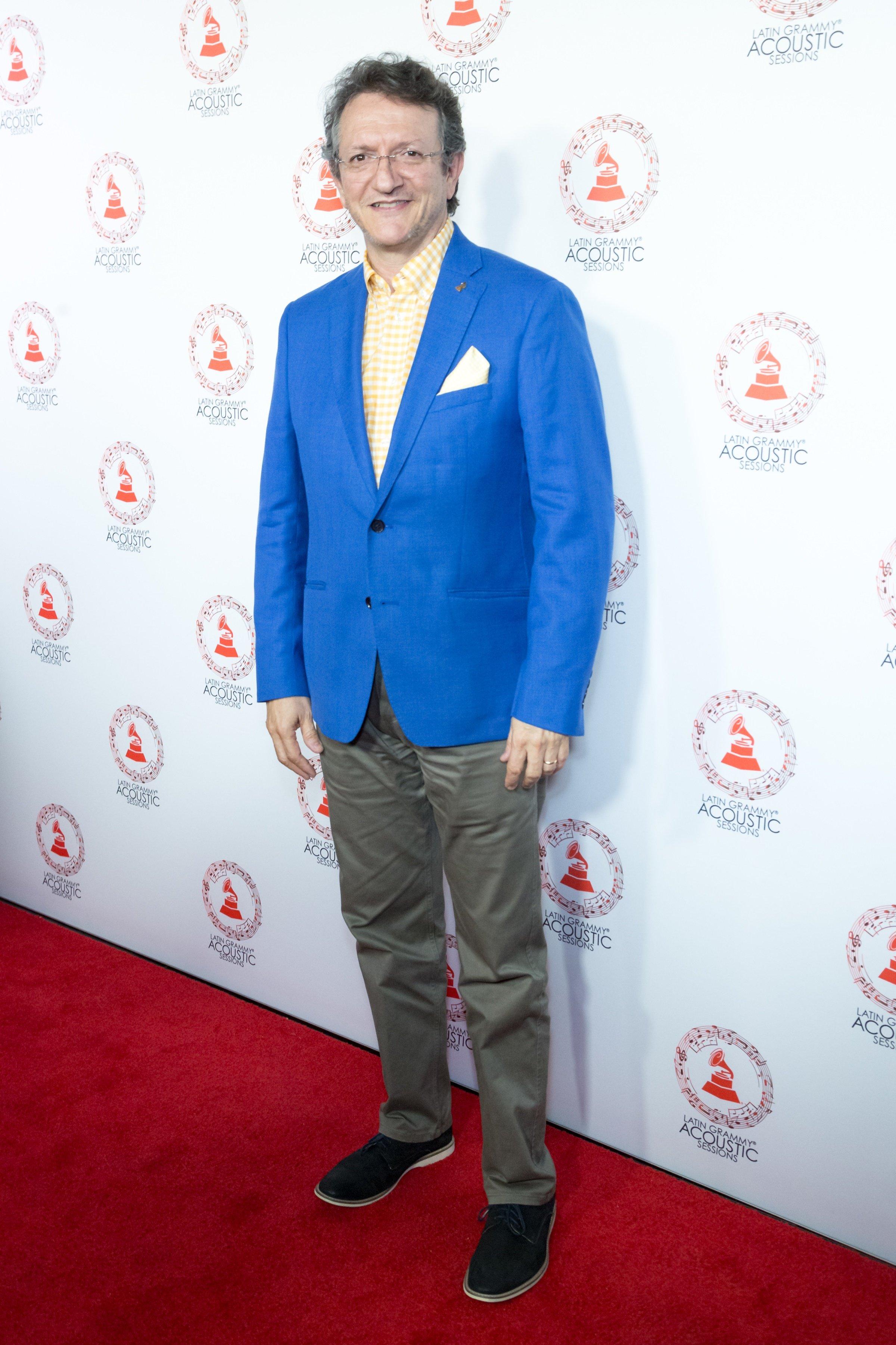
news
Latin Academy's Gabriel Abaroa Makes Latin Power Players List
President/CEO of the Latin Recording Academy among the "behind the scenes" innovators who are helping reshape Latin music and culture
With revenue spiking in 2017, the Latin music scene is not only thriving for artists but for the professionals behind the scenes. With that thought in mind, Billboard has revealed its 2017 Latin Power Players.
<iframe width="560" height="315" src="https://www.youtube.com/embed/HDhH9xorzW0" frameborder="0" allowfullscreen></iframe>
The more than 40-deep list name-checks the "innovators" who are contributing to Latin music's uptick, spanning categories such as labels, publishing, radio, touring, digital, and organizations.
Making the list is The Latin Recording Academy's own Gabriel Abaroa Jr., who has helmed the organization since 2003. With the Latin GRAMMY Awards telecast bolstering its position as The Biggest Night in Latin Music, Abaroa has recently focused the organization's efforts on funding scholarships for the next generation of Latin musicians.
In 2014 the Latin GRAMMY Cultural Foundation was launched with the mission of furthering the awareness and appreciation of the significant contributions of Latin music and its makers to the world's culture through scholarships, fellowships, grants and education programs. To date, the Foundation has awarded more than 100 scholarships totaling $2.5 million, including branded scholarships with artists such as Enrique Iglesias, Juan Luis Guerra and Miguel Bosé.
"We have done a lot, and largely due to Latin power and pride in Latin music," said Abaroa.
Abaroa was promoted to his current position as President/CEO in 2010. In 2014 his contract was extended until 2019.
Other professionals making Billboard's list include Nacional Records President Tomas Cookman, W.K. Entertainment CEO Walter Kolm, Lionfish Entertainment founder Rebecca Leon, Jenni Rivera Enterprises CEO Rosie Rivera, and Spotify Head of Global Cultures Rocio Guerrero.
Why The Latin GRAMMY Cultural Foundation Matters
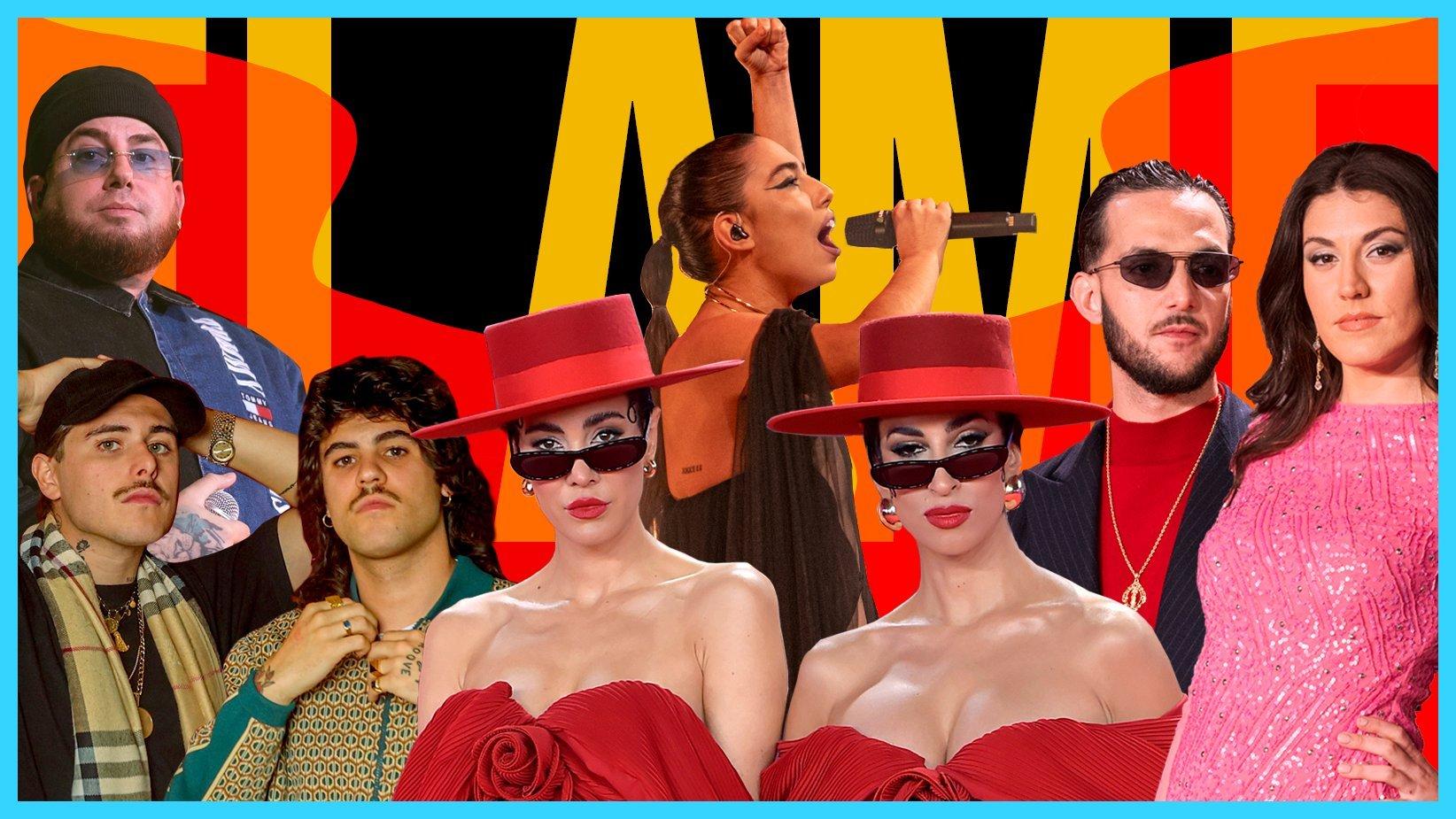
Photos: Atilano Garcia/SOPA Images/LightRocket via Getty Images; Ricardo Rubio/Europa Press via Getty Images; Juan Naharro Gimenez/Getty Images; PABLO GALLARDO/REDFERNS; Aldara Zarraoa/WireImage; Mario Wurzburger/WireImage
list
6 Artists Reimagining Flamenco For A New Generation: María José Llergo, C. Tangana, Mëstiza & More
Contemporary artists like La Plazuela, Queralt Lahoz, and Maka are transforming flamenco by blending traditional roots with innovative sounds and global influences.
Flamenco is undergoing a sweeping transformation. Propelled not by a single artist, but by a wave of creative talents, a new generation of artists are injecting fresh life into this storied genre.
Six years after Rosalía's 2018 release, El Mal Querer, catalyzed a wider renaissance in the flamenco world with an approach inspired by the legendary Romani flamenco singer Camarón de la Isla a new wave of artists are rushing in to redefine the landmark Latin sound.
A new generation of Spanish musicians draw deep inspiration from flamenco's rich traditions while redefining its contemporary form. Rooted in the flamenco traditions cherished by their ancestors, today's artists are innovating this heritage with a new set of sensibilities. Flamenco itself, with its diverse array of styles or palos, offers a unique medium of expression, characterized by distinctive rhythmic patterns, melody and emotional intensity.
Discover the vibrant future of flamenco through the innovative works of trailblazers like La Plazuela, Queralt Lahoz, Mëstiza, C. Tangana, Maka, and María José Llergo. From Maka's trap-fueled infusions of reggaeton to Lahoz's innovations on traditional guitar-playing techniques, each of these artists, with their unique contemporary take on traditional styles, is reimagining flamenco and captivating audiences around the world.
La Plazuela
La Plazuela duo Manuel Hidalgo and Luis Abril are both from Albaicín in the Andalusian city of Granada. It's a district infused with rich cultural history, where steep, winding streets are bursting with art and the sounds of flamenco.
La Plazuela soaks the rhythms of flamenco in a distinctively sunny sound, forgoing the woeful connotations of the genre to explore new, optimistic possibilities. On their new song "Alegrías De La Ragua" the pair teamed up with flamenco singer David de Jacoba and electro producer Texture. The track is an ode to the sugar cane fields of Andalusia, highlighting the region’s agricultural importance and intrinsic relationship with the land — distinctly Granada both in sound and story.
Queralt Lahoz
Born in Barcelona to an Anducian family, Queralt Lahoz was raised on the sounds of flamenco at home where her Granada-born grandmother immersed her in the musical traditions of southern Spain.
While her soulful, urban style deeply resonates with flamenco, Lahoz has stressed that she is not a purist of the genre and enjoys experimenting with different styles. Stripped back, brutally honest and direct, tracks like "De La Cueva a Los Olivos" is a multifaceted track that opens with rasgueado (percussive guitar technique integral to flamenco) that evolves into a brassy, jazzy chorus, and even includes a rap verse. She cites late flamenco great La Niña de los Peines alongside Wu-Tang Clan among her influences — a testament to her love of musical diversity.
Mëstiza
Mëstiza envisioned flamenco for the nightclub: The DJ duo Pitty Bernad and Belah were already hot names in the Spanish club scene before they combined forces.
Pitty hails from the southern region Castilla-La Mancha, and Belah from neighboring Andalucia. The two met in the Madrid DJ scene and shared a love for electronic music steeped in folkloric tradition. They are behind legendary Spanish club night Sacro, an immersive audiovisual experience rooted in ritualistic Spanish folklore. The duo has plans to bring their unique Sacro sound across the globe soon with to-be-announced performances planned for Europe, Asia, and the United States.
C. Tangana
C. Tangana (full name Antón Álvarez) co-wrote eight songs on former flame Rosalía's El Mal Querer and demonstrates his dexterity and vision in the sounds of flamenco on his 2020 release, El Madrileño. The album explores regional sounds from across Spain and Latin America, employing the finest artists from these genres as collaborators.
The album's first single, "Tú Me Dejaste De Querer" features flamenco stars Niño de Elche and La Húngara singing in the chorus between Álvarez’s rapped verses. Alvaréz’s tour of the album was based on a typical Spanish sobremesa (post-dinner conversation), with bottles of wine placed on a long table set with tapas, elbow-to-elbow with fellow musicians who clap palmas flamencas, play guitar, and provide backing vocals. El Madrileño earned three Latin GRAMMYs in 2021 and The Tiny Desk performance of the album is among the series’ most-watched concerts.
Maka
Granada-born Maka has been a pioneer in viewing flamenco through an urban lens. A versatile artist, he is both a skilled rapper and prolific singer/songwriter. In his 2014 release, Pna, Maka combined flamenco singing (canté) over hip-hop beats ("La Dirty Flamenca") and reversed the formula to rap over flamenco rhythms ("Vividor").
Maka returned to flex his mastery in flamenco in his 2021 album, Detrás de Esta Pinta Hay un Flamenco, which pays homage to the melodic pop-flamenco bands of the 1980s and 1990s with a throwback feel. His latest 2024 single "Amor Ciego'' combines a reggaeton beat with flamenco vocal embellishments, calling back to many of his early reggaeton and trap-fueled releases.
María José Llergo
María José Llergo released her debut album Ultrabelleza last October to critical acclaim, sparking an upcoming U.S. tour. As a trained flamenco vocalist, she graduated from the prestigious Escuela Superior de Música de Cataluña (Rosalía is a fellow alum.)
Llergo grew up in the small town of Pozoblanco, on the outskirts of the Andalusian city, Cordoba. Her grandfather, a vegetable farmer, taught Llergo flamenco from a young age, singing with her as he worked the land.
Llergo’s music combines flamenco with the sounds of nature, reimagined synthetically through electronic experimentation that results in lush, immersive soundscapes. "I turn like the moon in the sky... If I stop moving, I’ll die", she sings in Spanish on the track "Rueda, Rueda," contemplating the rhythm of life. Her lyrics are deeply poetic and metaphorical, tying place to emotion, and nature to feeling.
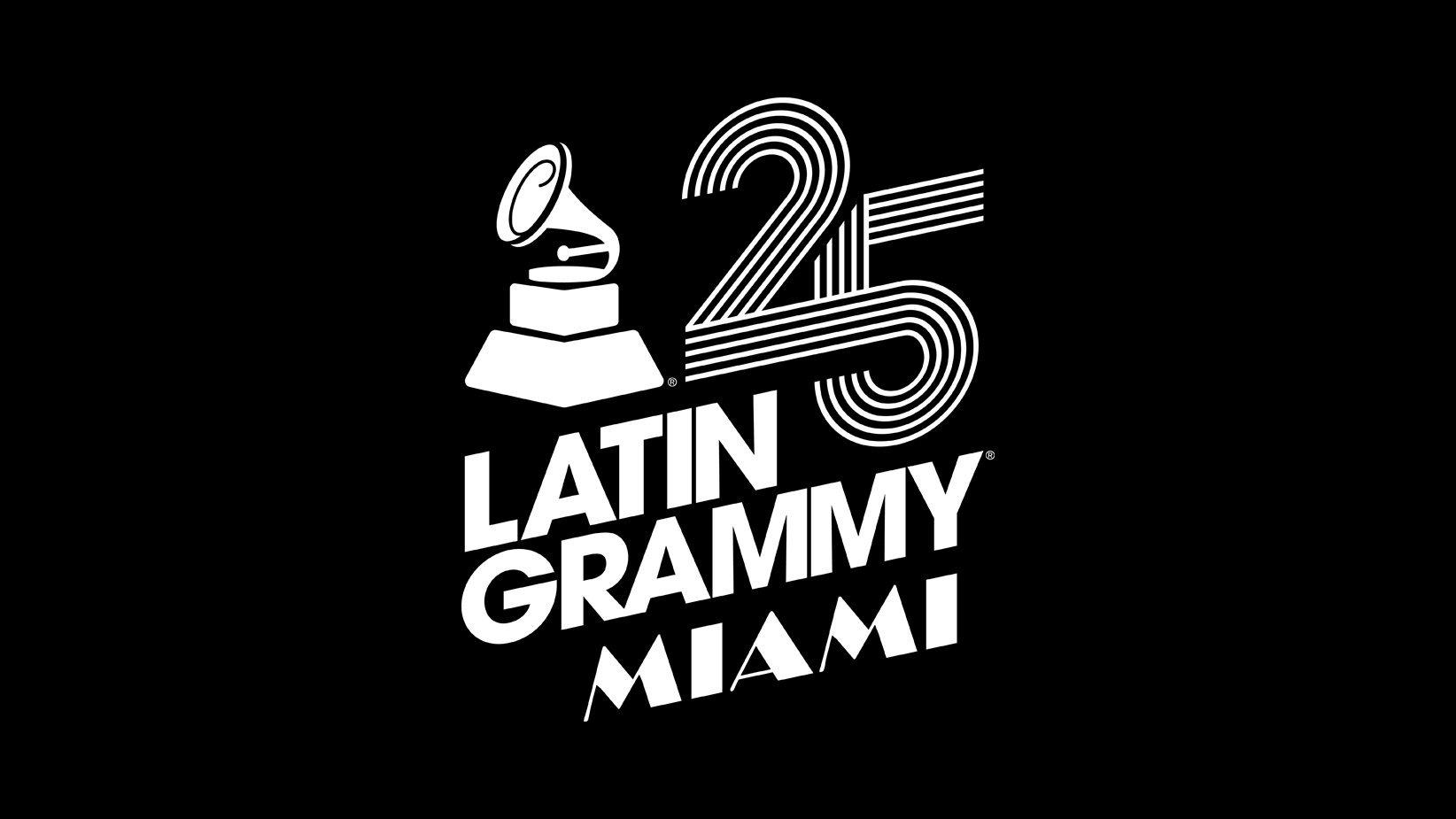
Graphic Courtesy of the Latin Recording Academy
news
2024 Latin GRAMMYs To Take Place Thursday, Nov. 14, In Miami; Nominations To Be Announced Tuesday, Sept. 17
The 2024 Latin GRAMMYs mark the 25th anniversary of the Latin GRAMMY Awards. Official Latin GRAMMY Week 2024 events will take place throughout Miami-Dade County, including marquee events like Person of the Year and the Premiere Ceremony.
The Latin Recording Academy today announced that the 2024 Latin GRAMMYs, officially known as the 25th Latin GRAMMY Awards, will take place on Thursday, Nov. 14, in Miami at Kaseya Center, in partnership with Miami-Dade County and the Greater Miami Convention & Visitors Bureau (GMCVB). Additionally, the nominations for the 2024 Latin GRAMMYs will be announced Tuesday, Sept. 17.
The 2024 Latin GRAMMYs celebrate the 25th anniversary of the Latin GRAMMY Awards, a momentous milestone for the Latin Recording Academy. The show's return to Miami is also a homecoming for the Latin GRAMMYs, returning to the place it calls home, where the Latin Recording Academy's journey commenced and where its headquarters remain today. The 2024 Latin GRAMMYs mark the third time that the Latin GRAMMYs will be held in Miami: The first time took place in 2003 and the second time took place in 2020, when the show was closed to the public due to the COVID-19 pandemic.
The three-hour telecast of the 2024 Latin GRAMMYs, produced by TelevisaUnivision, will air live on Univision, Galavisión, and ViX on Thursday, Nov. 14, beginning at 8 p.m. ET/PT (7 p.m. CT), preceded by a one-hour pre-show starting at 7 p.m. ET/PT.
The 2024 Latin GRAMMYs will see the debut of a new Field and several new Latin GRAMMY Categories, including Best Latin Electronic Music Performance, housed within the new Electronic Music Field, and Best Contemporary Mexican Music Album (Regional-Mexican Field), among other changes.
Ahead of the 2024 Latin GRAMMYs, the Latin Recording Academy will host multiple official Latin GRAMMY Week 2024 events throughout Miami-Dade County, including marquee events like Leading Ladies of Entertainment, the Best New Artist Showcase, Special Awards Presentation, Nominee Reception, Person of the Year, and the Premiere Ceremony preceding the telecast. More details on the official Latin GRAMMY Week 2024 events and calendar will be announced in the coming months.
The news of the 2024 Latin GRAMMYs was announced via a press conference in Miami today. Watch the full press conference, featuring Latin Recording Academy CEO Manuel Abud, below.
"Since our first awards presentation in the year 2000, the Latin GRAMMYs have provided an international spotlight for Latin music second to none and provided iconic performances that have become part of global music and pop culture history. We are thrilled to celebrate our 25th anniversary in Miami," Latin Recording Academy CEO Manuel Abud said. "Miami has evolved to become the epicenter of Latin entertainment and we are grateful for the community support and enthusiasm we have received."
"Welcome home, Latin GRAMMYs! As the cultural capital for Latinos in the United States, there's no better place than Miami-Dade to host the best of Latin music and entertainment," said Miami-Dade County Mayor Daniella Levine Cava. "It's a true honor to host this incredible event once again and welcome people from all over the world to enjoy the vibrant and diverse cultural hub we call home. This event celebrates the very best in music, and we are proud to showcase Miami's unique energy, where music and culture collide in the most spectacular way."
"We are excited to bring to life the landmark 25-year celebration of the Latin GRAMMYs from the city we call home – the city where Hispanic culture has flourished as a driving force of influence and impact globally," said Ignacio Meyer, President of Univision Television Networks Group at TelevisaUnivision. "As the Home of Latin Music, we're excited to deliver yet another unforgettable night of excellence in music, grounded in our passion and unwavering commitment to shining a bright light on the most culture-defining moments for Spanish-speaking audiences worldwide."
"This announcement underscores Greater Miami's status as a global hub at the intersection of multicultural music, entertainment, events and tourism," said David Whitaker, president and CEO of The Greater Miami Convention & Visitors Bureau. "On behalf of the travel and hospitality industry of Greater Miami, we are absolutely thrilled by the news that the 25th Latin GRAMMYs is returning home to Miami – bringing with it an influx of visitors eager to experience the excitement and energy of this iconic destination."
The Latin GRAMMY Awards are the preeminent international honor and the only peer-selected award celebrating excellence in Latin music worldwide.
Additional key dates for the 2024 Latin GRAMMYs include:
July 24, 2024 — Aug. 5,2024: First Round of Voting
Sept. 17, 2024: Nominations Announcement
Sept. 27, 2024 — Oct. 10, 2024: Final Round of Voting
Visit the Latin Recording Academy website for more information regarding the 2024 Latin GRAMMY Awards season.
Join the conversation online and share the official hashtags on all popular social media platforms: #LatinGRAMMY #25AñosDeExcelencia.
The Latin GRAMMY Cultural Foundation Announces The 2024 Sebastián Yatra Scholarship
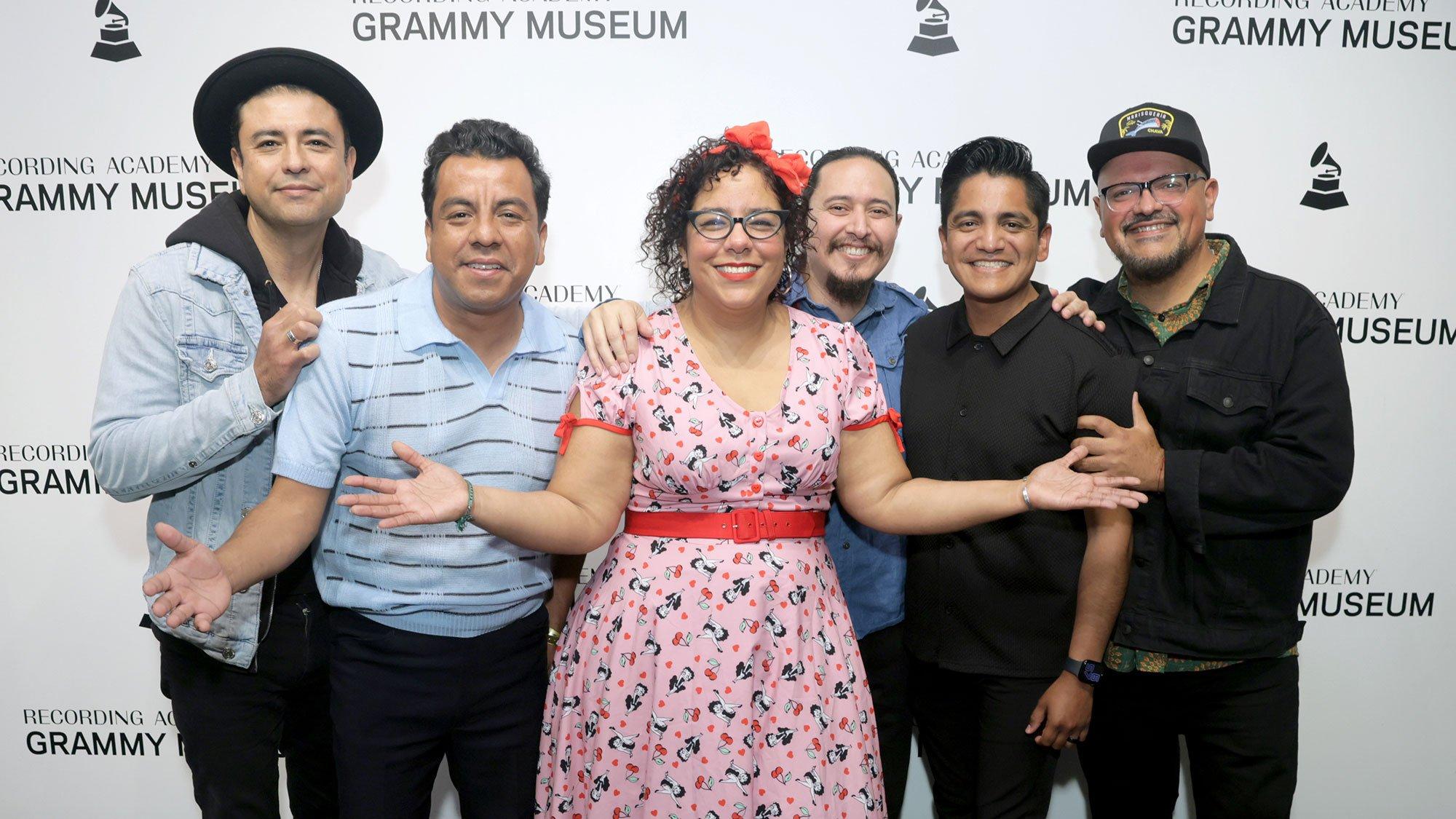
Photo: Rebecca Sapp/Getty Images for The Recording Academy
news
La Santa Cecilia Celebrates Their 'Alma Bohemia' With Documentary Screening & Performance At The GRAMMY Museum
In a documentary screening detailing the making of their album 'Cuatro Copas' followed by a discussion and live performance at the GRAMMY Museum, La Santa Cecilia recounts years of making music and friendship.
"Oh no, I’m going to start crying again," says La Santa Cecilia singer La Marisoul during a touching scene in Alma Bohemia, the documentary directed by Carlos Pérez honoring the Los Angeles band’s 15 year anniversary.
As it turns out, there are many reasons to be emotional about this film — and the very existence of La Santa Cecilia in the contemporary Latin music landscape. Fittingly, Alma Bohemia was received enthusiastically by the capacity audience during an exclusive screening on April 3 at the GRAMMY Museum’s Clive Davis Theater in Los Angeles.
Formed by La Marisoul (real name is Marisol Hernández), bassist Alex Bendaña, accordionist and requinto player José "Pepe" Carlos and percussionist Miguel "Oso" Ramírez, La Santa Cecilia was for years one of the best kept secrets in the Los Angeles music scene. As close friends and musicians, they won over audiences with an organic, down-to-earth sound and a lovely songbook that draws from traditional formats such as bolero, ranchera and nueva canción.
Alma Bohemia follows the making of La Santa’s 2023 album, Cuatro Copas Bohemia en la Finca Altozano. A celebration of the band’s longevity, the session also functions as a subtle, yet powerful musical experiment. It was recorded at the Finca Altozano in Baja California, where the band members stayed as guests of celebrated chef Javier Plascencia — a longtime fan.
Argentine producer Sebastián Krys — the band’s longtime collaborator — calls this his Alan Lomax experiment. The album was recorded live on tape with a variety of strategically placed microphones capturing hints of ambient sonics — a sweet afternoon breeze, the clinking of glasses, the musicians’ banter, the soft sounds that accompany stillness.
From the very beginning, the making of Cuatro Copas mirrors the band’s bohemian cosmovision: A communal approach where the quartet — together with carefully selected guest stars — get together to share the magic of creation, the unity of like-minded souls, homemade food, and more than a couple of drinks. In effect, the bottles of mezcal and never ending rounds of toasting quickly become a running joke throughout the documentary.
La Marisoul’s fragile lament is enveloped in spiraling lines of mournful electric guitars with soulful understatement on the track "Almohada." Guest artists liven things up, with Oaxacan sister duo Dueto Dos Rosas adding urgency to "Pescadores de Ensenada," while son jarocho master Patricio Hidalgo ventures into a lilting (yet hopeful) "Yo Vengo A Ofrecer Mi Corazón," the ‘90s Argentine rock anthem by Fito Páez.
Visibly delighted to be part of the bohemia, 60-year-old ranchera diva Aida Cuevas steals the show with her rousing rendition of "Cuatro Copas," the José Alfredo Jiménez classic. "Viva México!" she exclaims as the entire group sits around a bonfire at night, forging the past and future of Mexican American music into one.
Read more: La Santa Cecilia Perform "Someday, Someday New"
Following the screening, the band sat down for a Q&A session hosted by journalist Betto Arcos. Sitting on the first row, a visibly moved young woman from El Salvador thanked the band for helping her to cope with the complex web of feelings entailed in migrating from Latin America. La Santa’s songs, she said, reminded her of the loving abuelita who stayed behind.
"We love the old boleros and rancheras," said La Marisoul. "We became musicians by playing many of those songs in small clubs and quinceañeras. It’s a repertoire that we love, and I don’t think that will ever change."
Carlos touched on his experience being a member of Santa Cecilia for about seven years before he was able to secure legal status in the U.S. When the band started to get concert bookings in Texas, they would take long detours on their drives to avoid the possibility of being stopped by the authorities. Carlos thanked his wife Ana for the emotional support she provided during those difficult years.
Ramírez took the opportunity to acknowledge producer Krys for being an early champion of the band. "He had a vision, and he made us better," he said, flashing forward to a recent edition of the Vive Latino festival. "There were about 12,000 people to see us," he said. "And they were singing along to our tunes."
"The band is just an excuse to hang out with your friends," added La Marisoul just before La Santa performed two live songs. Her voice sounded luminous and defiant in the theater’s intimate space, always the protagonist in the group’s delicately layered arrangements.
"The first time I got to see the finished documentary, I felt proud of all the work we’ve done together," said producer Krys from his Los Angeles studio the day after the screening. "On the other hand, there’s a lot of work ahead of us. I believe La Santa Cecilia deserves wider exposure. They should be up there among the greatest artists in Latin music."
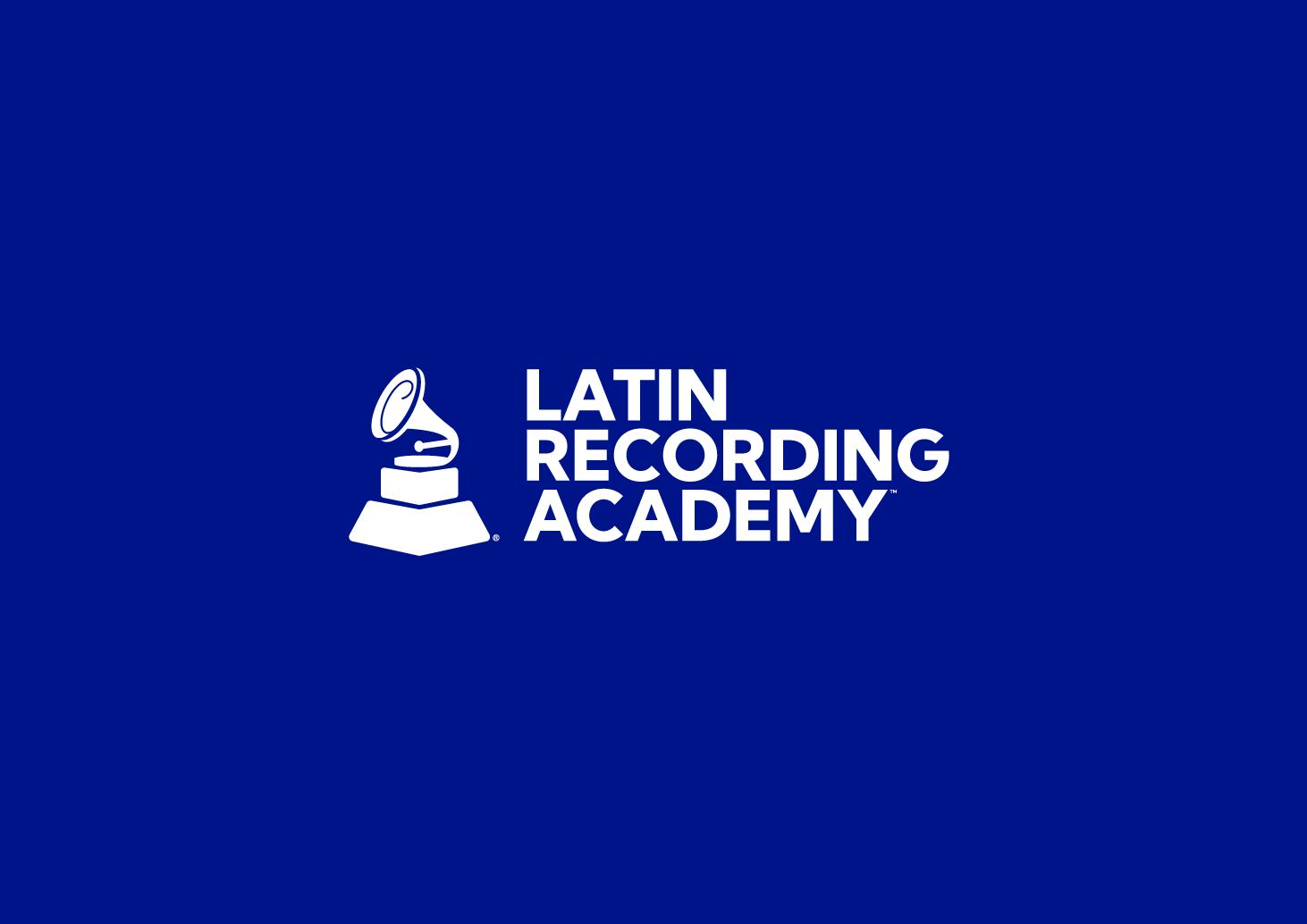
Graphic Courtesy of the Latin Recording Academy.
news
Two New Categories Added For The 2024 Latin GRAMMYs: Best Latin Electronic Music Performance & Best Contemporary Mexican Music Album
New fields and revised categories expand the 2024 Latin GRAMMYs, officially known as the 25th Latin GRAMMY Awards, mirroring the dynamic evolution of Latin music.
The Latin Recording Academy has announced significant updates to the eligibility guidelines for the 2024 Latin GRAMMYs, officially known as the 25th Latin GRAMMY Awards, introducing a new field and categories, and revising existing Category requirements to better reflect the evolving musical landscape.
To reflect the evolving landscape of Latin music, The Latin Recording Academy has introduced a new Electronic Music Field, highlighting a Category for Best Latin Electronic Music Performance tailored for singles and tracks, and a Best Contemporary Mexican Music Album Category in the Regional-Mexican Field for albums majorly featuring new material while retaining the core of Regional Mexican Music genres.
Further adjustments include a renaming in the Portuguese Language Field to encompass Música Popular Brasileira and Afro-Portuguese-Brazilian Music, a refined definition for the Best Singer-Songwriter Song category, an update to the Best Long Form Music Video criteria allowing for shorter videos, and a new nominations protocol based on entry numbers, aiming to enhance the representation and recognition of diverse Latin music genres.
New Field & Category
FIELD: Electronic Music
CATEGORY: Best Latin Electronic Music Performance
For singles and tracks only (vocal or instrumental). Recordings must have 51 percent playing time of Latin Electronic music genres (as defined by the Latin Electronic Committee), as well as related emerging genres, and Latin elements, in order to accurately reflect the current trends in Latin electronic music. Recordings containing interpolations/sampling are eligible if the interpolation/sampling does not constitute more than 25 percent of the lyrics and/or 51 percent of the music of the original song. Latin electronic remixes are eligible. Award is presented to solo artists, duos or groups (for groups of more than 10 members, the statuette will be presented to the “leader” of the group). Winner’s Certificates are presented to producer(s), engineer(s), mixer(s), composer(s) and to the original recording artist, if applicable.
New Category
CATEGORY: Best Contemporary Mexican Music Album (Regional-Mexican Field)
For vocal or instrumental albums of Contemporary Regional Mexican Music, in Spanish, which contain at least 51 percent of the total time recorded with new material, and which maintain at least 60 percent of the essence of the genres of Regional Mexican Music. Award is presented to solo artists, duos or groups, producer(s), recording engineer(s) and mixing engineer(s) of 51 percent or more of the total playing time of the album. Winner’s Certificates are presented to mastering engineer(s) and to producer(s), engineer(s), and mixer(s) of less than 51 percent of the total playing time (if not the artist).
Additional Category Amendments
CATEGORY NAME CHANGE: Best MPB (Música Popular Brasileira) / MAPB (Música Afro Portuguesa-Brasileira) Album (Portuguese Language Field)
For vocal or instrumental Música Popular Brasileira and Afro-Portuguese-Brazilian Music albums containing at least 51percent of total play time of new material.
AMENDMENT TO DEFINITION: Best Singer-Songwriter Song (Singer-Songwriter Field)
For singles or tracks that contain at least 60 percent of the lyrics in Spanish, Portuguese or any native regional dialect. Must be a new song composed and performed 100percent by the singer-songwriter(s). Award is presented to the songwriter(s). Winner’s Certificate presented to the music publisher.
NEW VIDEO ELIGIBILITY CRITERIA: Best Long Form Music Video Category (Music Video Field)
Eligible videos in Best Long Form Music Category consist of at least 12 minutes of duration (reduced from 20 minutes).
AMENDMENT TO THE RULE REGARDING NUMBER OF NOMINATIONS: Number of nominations in a category will be based on the number of entries (All Fields)
Each category shall have at least 40 distinct artist entries. If a category receives between 25 and 39 entries, only three recordings will receive nominations in that year. Should there be fewer than 25 entries in a category, that category will immediately go on hiatus for the current year and entries will be screened into the next most logical category. If a category receives fewer than 25 entries for three consecutive years, the category will be discontinued, and submissions will be entered in the next most appropriate category.
Online Entry Process
NEW GUIDELINES FOR SUBMISSIONS: Single Submission Round
All submissions for the Online Entry Process (for recordings released June 1, 2023 through May 31, 2024) will occur in one single round of entries, starting on April 1, 2024, and closing on April 30, 2024 at 6 p.m. (PT). Any releases scheduled for May 2024 must be submitted in April, before the Online Entry Process closes, and the streaming link and credits must be submitted by May 31, 2024.
REMOVAL OF FINAL SUBMIT CONCEPT
Submissions can be completed ‘as they go’, there is no need to hold on completion of all entries for a final submit, thus facilitating the submission of entries.
All updates go into effect immediately for the upcoming 25th Annual Latin GRAMMY Awards® taking place in November 2024. To view this year’s Awards calendar, visit https://www.latingrammy.com/en/awards/calendar.
